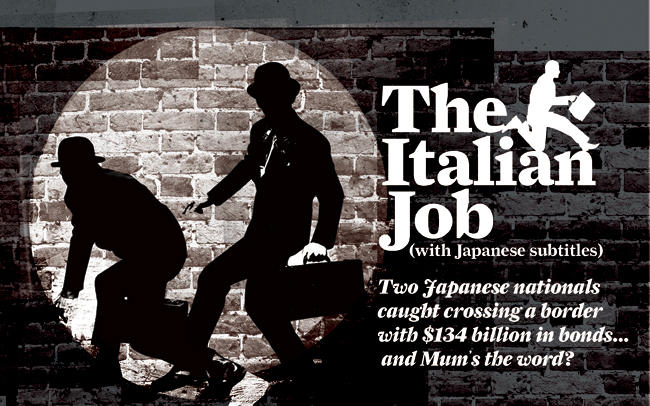Imagine the following scenario. A small Italian town on the Swiss border. The customs officers, checking the passengers on a local cross-border train, notice among the usual workers making their daily commute to Switzerland a couple of well-dressed Asian men, one of whom is carrying a briefcase. When examined, the briefcase proves to have a false bottom, beneath which lie US Treasury bearer bonds, whose value totals $134 billion (yes, that's billion with a b, not million). The two men are traveling on Japanese passports. Just a day after the Japanese Finance Minister announces his absolute faith in the almighty dollar and US T-bills.
Good start to a spy story or thriller, right? And if it happened, it would be front-page news round the world? Especially in Japan, you'd think, since two Japanese passports are involved. After all, $135,000,000,000 is a lot of money, even in these days of bank rescues and failing manufacturing industries.
Well, it did happen - almost a month ago (June 3, to be precise). The exact scenario described above took place. The town was Ponte Chiasso, the bearer bonds were in $500 million and $1 billion denominations, and the two men had Japanese passports. Given the propensity of the Japanese media (especially) to make mountains out of wormcasts (let alone molehills) involving Japanese nationals, how did this go unnoticed? Only now is the mainstream media worldwide starting to report it, and then in minor keys.
So it's like a Sherlock Holmes story:
"The curious incident of the dog in the night-time."
"The dog did nothing in the night-time."
"That was the curious incident." [Silver Blaze, if you're interested]
For "dog" read "media".
$135 billion is a fair amount of money. You could buy the GDP of several respectable European countries with this money, and still manage to pick up Mongolia or Cambodia (for example) with the small change. And coincidentally, the Japanese Finance Minister actually did say the day before, "our trust in U.S. Treasuries is absolutely unshakable" - at a meeting in Italy, no less.
There are a couple of things to determine. First, are the passports genuine (and are the men actually Japanese), and who are the people traveling on them? Next, are the bonds genuine? Well, it seems to have taken the Consulate in Milan a mere two or three weeks to come up with an official pronouncement on the first. Yes, the passports appear to be genuine. One of the men appears to be from Kanagawa-ken and the other from Fukuoka-ken.
And the bonds? US T-bills stopped being issued as bearer bonds (effectively the same as cash) in the 1980s. So these are old, if they are real. According to some sources, some of these bonds had a picture of the space shuttle on them and were dated long before the shuttle. This would obviously point to their being fakes. However, initial reports from the Italian police suggested that they had no immediate way of determining whether these were genuine or not.
But just for fun, let's look at things from the viewpoint of just one of the most recent "reports" (and I use the word very loosely) from the New York Times on this matter:
Adding spice was the whole Bond — James Bond — aspect of the tale.
Ah, yes. We've had John le Carré. Tom Clancy, James Bond (I think I spotted Robert Ludlum there somewhere) all dragged in to illustrate just how ludicrous and improbable all this was.
"The whole thing is a total fraud," Stephen Meyerhardt, a spokesman for the Treasury Department, told The Times on Thursday. "They don't look anything like real securities, which in any case were never issued in any of those denominations."
Denials have been flying from the Treasury Department - for the last week only - and this story's been live for a few weeks now. Wouldn't you think that the first thing that any responsible department would do is get someone on a plane to look at the things and pronounce them as fake? But no, first reports said that the US Treasury had viewed pictures over the Internet and determined from that they were fake. Apparently bonds were issued in these denominations - at one time, anyway - for governmental purchases - not, of course, for individuals or even corporations.
Also, from the NYT:
Also unknown are the whereabouts of the two men, who were released after being stopped in early June. Italian law does not call for the criminal arrest of persons found to be taking funds without permission to another country. It might have been another matter if the police had determined immediately that the bonds were false.
Note this - the bonds were fake enough to be determined as fake over the Internet, but the Italian financial police, who are apparently quite competent, couldn't tell?
"The men were questioned, but not arrested," said Naoki Oyakawa, an official at the Japanese consulate in Milan, which contacted judicial officials in Como after reading about the seizure in the Italian papers.
He told The Times that the two men had valid Japanese passports, but he would not elaborate further on their identities. "We don't know where they are now," he said. "We have had no contact with the two men. They have not asked us for our help."
Let's get this straight - the Italian police detained two men with Japanese passports carrying alleged financial instruments worth a small country's GDP - they couldn't tell immediately what was real or not - they have Japanese passports to look at - and the consulate in Milan, less than 100 kilometers away, only finds out about this in the press after the incident? If you believe that, please contact me about this really cool bridge I have lying around for sale cheap.
I think it's pretty clear that the whole truth is not being told here, and the more you dig on the Internet, the more confusing it becomes. There is a definite break in the pattern of the mainstream media stories being told up to about a week ago - up to that point, the authenticity of the bonds was apparently not determined, despite the "obvious" nature of the fakes. After that a consistent story was being told to the media by the authorities, and that story makes little sense.
The story has attracted a number of right-wing American commentators, who somehow seem to see this as a "liberal" plot to undermine the US economy (I don't pretend to follow the logic of these people).
My personal theory when I first heard it was that Mad Uncle Kim was once again up to his tricks, undermining the dollar, driving wedges between Japan and the US, and whatever else passes for entertainment in Pyongyang these days.
But even since the official denial of the authenticity of these bonds, conspiracy rumors are still floating around. For example:
Confidential sources, whose reliability AsiaNews could not confirm, claim that one of the two Japanese stopped and then released in Ponte Chiasso was Tuneo Yamauchi, brother-in-law of Toshiro Muto, who was until recently Deputy Governor of the Bank of Japan, which of course does not automatically mean that the securities are real. Asia News 23 June
It's worth reading the whole article there, which actually raises more questions than it answers. Other conspiracy theories are rife, including off-the-books bond issues by the FRB, dumping of T-bills by Japan, Korean false flag operations, and the like.
My two current personal favorite ideas:
- The two men were somehow brought together by West African (or maybe Eastern European) swindlers, and were given worthless fakes in exchange for their financial assistance in retrieving hidden treasure of some kind (all fictitious, of course). They were depositing their ill-gotten "gains" in a Swiss bank. The Japanese press don't want to advertise Japanese people as stupid credulous marks (though I do have personal knowledge that Japanese are no wiser in rejecting scams than other nationalities), hence the deafening silence. Doesn't explain US media blackout, though.
- The two men were meant to be caught with fake bonds. Meanwhile, whoever had the real bonds (probably a much lower amount) slipped through and the bonds are now in Zurich. Doesn't really explain the news blackout.
Nothing really makes sense, and I have a feeling we may never learn the whole truth here, unless one of the Japanese weeklies gets one of these gentlemen completely legless in a bar one night and persuades them to spill the beans. A friend of mine feels this is unlikely, and an accident will be arranged for these hapless individuals if there is any official involvement at all.
But in the meantime, if you have any better ideas, please address them to me, c/o J@pan.Inc on the back of a $500,000,000 US Treasury bearer bond.
Other posts by Hugh Ashton:







